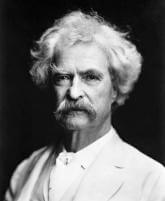
Biographie de Mark Twain
Mark Twain (1835-1910). American man of letters and novelist, he is best remembered for his keen social observation and as the creator of the immortal Huck Finn. Mark Twain was born Samuel Langhorne Clemens in Missouri in November 1835. His family settled in Hannibal, a small township on the Mississippi, where he lived until he was eighteen After his father's death in 1843 Clemens left school to become a printer's apprentice, working on the Missouri Courier.
From 1853 he travelled widely as a journeyman printer in the East and Middle West, but gave this up in 1837 in favour of becoming a steamboat pilot alter a trip down the Mississippi. After eighteen months' apprenticeship he became a licensed pilot, a profession he loved "better than any I have followed since". His time on the river proved a rich source of inspiration for his later writing, as while he was there he met "all the different types of human nature Chat are to be found in fiction, biography or history".
The outbreak of Civil War in 1861 brought an end to all river traffic and Clemens went on to spend time as an army volunteer, a gold prospector in Nevada, a timber prospector and a journalist before finally beginning his literary career. He first adopted the pseudonym "Mark Twain" (a boating term meaning two fathoms) in 1863, as the signature to a humorous travel letter. His major book The Innocents Abroad, based on his travels in Europe and the Holy Lands, appeared in 1869.
In i 87o he married Olivier Langdon and settled the following year in Connecticut, where he lived for seventeen years as a successful and popular writer. It was during this time that he wrote many of his best books : Roughing It, The Adventures of Ton Sawyer, Life on the Mississippi, a superbly evocative memoir, and his masterpiece, The Adventures of Huckleberry Finn. He combined his writing with a great deal of travelling, and some of his must humorous work can be found among his accounts of his trips.
For many years he was a partner in a printing and publishing firm but a heavy investment in an unperfected typesetting machine drove him to bankruptcy in 1894. In order to try and redress his finances he set out on a world-wide lecture tour but while abroad his beloved daughter Suzy died. His later writing reflects these disasters with its increasing irony and bitterness. Remaining a celebrated figure until his death in 1910, lie was noted as much for his customary white suit and mane of white hair as for his uncompromising stands against injustice and imperialism.
Mark Twain always intended that The Adventures of Tom Sawyer (1876), based on experiences from his own childhood, should be read by both children and adults. As his first celebration of the freedom of boyhood it remains an evocative and highly engaging account of growing up on the banks of the Mississippi in the early 1840s.
